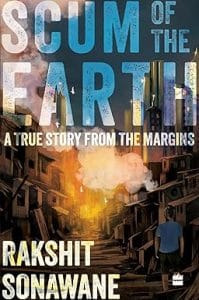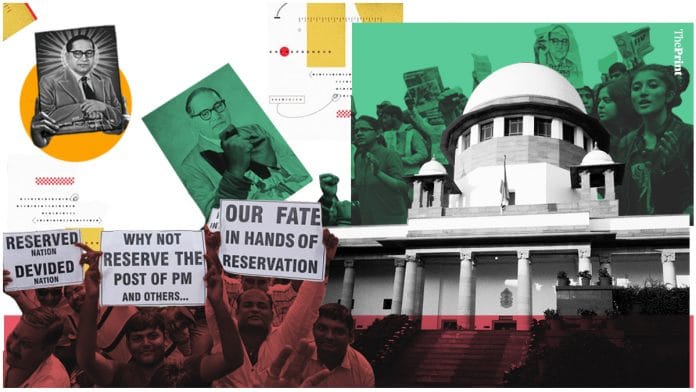What happened?’ Dagadoo asked as soon as Avinash came up the stairs of their house. Godavari and he had been waiting anxiously for a long while for their son to return home.
‘What will happen?’ Godavari asked with a smile. ‘He must have got the job.’
Avinash looked at her. ‘How do you know?’ he asked.
‘I know,’ she said. ‘I prayed to God. He knows our plight, and he will hear my prayer.’
Avinash laughed. ‘In fact, I’ve not been selected,’ he said. ‘And the irony is that I’m among the top three candidates in the merit list.’
‘Oh! Then why not?’ she asked, her smile fading quickly.
‘I thought you would be easily selected,’ Dagadoo said. ‘What went wrong?’
‘They have asked me to submit a caste certificate,’ Avinash said.
‘Caste certificate? But you’ve not applied for a reserved seat.’
‘I told them that—they are going to seek legal advice and then decide.’
‘Oh,’ Dagadoo sighed. ‘But I think that if they seek a legal opinion, they’ll be told to appoint you.’
‘I hope so,’ Avinash said.
‘Dagadoo, are you home?’ someone hollered from outside the house.
Avinash went to the door. It was Hari. ‘Yes, Hari kaka, he’s at home.’
Hari smiled and began ascending the steps slowly. On reaching the door, he removed his footwear and came inside, panting heavily. Dagadoo rose to greet him while Godavari brought him a glass of water, which he gulped down thirstily.
Also read: ‘Merit vs quota’ debate has disadvantaged SC, ST, OBCs. Time to expose the ‘meritwalas’
‘It’s good that you are all at home,’ he said, wiping his face with a handkerchief. ‘Have you applied for a job at the port?’ Hari asked Avinash. ‘There are some vacancies right now.’
‘Yes,’ Avinash said. ‘They interviewed me today.’
‘That’s great! Don’t worry, I’ll ensure that you are selected,’ Hari exclaimed. Then, turning to Dagadoo, he said, ‘Your son has hit a jackpot. Your life is going to change for the better.’ Dagadoo smiled.
‘But they have put his appointment on hold,’ Godavari said.
‘They are asking for a caste certificate.’
‘Then submit it,’ Hari said.
‘We don’t have a caste certificate,’ Dagadoo said.
‘No problem! I’ll help you; I have connections. I’ve told you this before as well!’ Hari said. ‘The only thing is you’ll have to spend some money.’
‘But I’ve applied in the general category, Hari kaka, where no caste certificate is required,’ Avinash said.
Hari laughed. ‘Why do you need to go in the general category?’ he asked. ‘Get a caste certificate—it’s our right. Just come to my house tomorrow with all your documents.’
‘Hari, stay out of it,’ Dagadoo said. ‘Avinash will get his appointment letter without a caste certificate and without spending money.’
Hari shook his head and stared at Dagadoo. ‘Brother, don’t ruin your son’s future. Listen to me,’ he said. ‘I can get it done.’ Then, turning to Avinash, he said, ‘Don’t pay me anything right now. Pay me later. After all, I can do at least this much for my nephew.’
‘No, Hari,’ Dagadoo said curtly. ‘Please don’t bother.’
‘You are so strange, Dagadoo,’ Hari said. ‘You’ve made your own life miserable because of your impractical thoughts. Don’t do the same to your son’s life, too.’
Dagadoo stared at Hari. ‘You will never understand,’ he said.
‘You were the first person from our village to migrate to this city and what have you earned?’ Hari asked. ‘Look at me—I own two apartments, two vehicles and I’ve recently bought some land near our village. I’m earning a lot of money, while you’re still languishing in a slum.’
Dagadoo nodded. ‘Yes, you are certainly wealthy, but what is the colour of your money?’ he asked.
‘The colour of my money?’ Hari laughed mockingly. ‘Nobody is bothered about the colour of money in this world. It may be white or black or any other colour—the only thing that matters is whether you have it or not.’
‘It all depends on your values, Hari. I’m happy with mine, and you are free to choose yours.’
Hari shook his head in despair and sipped the tea Godavari had served him in silence. Then he slowly got up, balancing his obese body on his hands as he rose to his feet. The gold chain around his neck flashed. ‘So, shall I expect you tomorrow, if you change your mind, that is?’ he asked Avinash with a sheepish smile.
‘No, Hari, we don’t need your help,’ Dagadoo said.
‘All right,’ Hari said. He went out of the door, slipped his feet into his footwear and slowly descended the steps.
After he left, Godavari said, ‘You should’ve taken his help—he knows a lot of people.’
‘You know he’s mixed up with crooks,’ Dagadoo said.
‘But what will happen to Avinash’s appointment?’
‘Don’t worry—just be patient.’
‘But we’re abandoning the easy way out and making his life difficult,’ Godavari said. ‘He’s just a young boy.’
Dagadoo glanced at her and then at Avinash. ‘Don’t you realize that he’s among the toppers in the merit list?’ he asked. ‘Have faith in the Constitution. Instead of overprotecting him and making his life easier, let him face difficulties and overcome them. Remember the difficulties faced by Babasaheb. He’s our guiding light.’
Avinash felt dejected and unwanted. Brooding over his plight, he sat on the threshold of the house and thought about his father, his community and Babasaheb. Perhaps his father was right. If he had merit, there was no need to seek a reserved seat. Some other needy candidate could use it. There were enough people who were in worse conditions than him.
Avinash eagerly awaited the decision of the port authorities. A fortnight passed and just as he was beginning to lose hope, a letter arrived, informing him that his appointment had been confirmed, subject to a medical examination at the port hospital. His parents were both relieved and elated at the development.
Also read: India has entered a new era of reservation devoid of social justice
‘I knew he would be appointed,’ Dagadoo told Godavari. ‘Now he has a secure government job.’
‘Yes, and once I join, I want you both to give up your jobs and relax. You don’t need to work anymore,’ Avinash said. ‘Now it’s my turn.’
‘I would like to continue working,’ his father said. ‘But your mother can stop working now.’
‘I don’t know what to do,’ Godavari said, looking bewildered. ‘Let me think it over.’
Avinash visited the port hospital the next day for an examination and was declared fit for work. When he went to the dock office, the manager handed over his appointment letter. ‘We consulted the legal department, and they cleared your case,’ he said.
‘I was hoping it would be cleared, sir,’ Avinash said.
The manager smiled sheepishly. ‘Err, well, we were hesitant because we were not comfortable with taking you in the open category,’ he said.
‘Why? Is there no merit in me?’
The manager shook his head. ‘That’s not the issue. Frankly speaking, you are blocking one seat in the open category, which would’ve otherwise gone to a general candidate from the upper castes. You have now reduced the seats in the open category by one.’
‘Oh! So, clearly, even if a person from a lower caste refuses reservation, you don’t consider him at par with his upper-caste counterpart, despite his merit,’ Avinash said.
The manager rose from his seat. ‘Let’s not get into all this,’ he said. ‘The Constitution is on your side, and your appointment has been cleared. Report to the timekeeper’s office for duty tomorrow.’
Avinash left the dock office with mixed feelings. While he was elated that he had got a permanent white-collar job in a central government concern, he was anguished by the attitude of people occupying key positions. Later that day, when he broke the news of his confirmation to his parents, they were ecstatic.
‘They had no valid reason to reject you,’ Dagadoo said.
‘They had an unofficial reason,’ Avinash replied, narrating his conversation with the manager.
Dagadoo shook his head in despair. ‘These prejudices suit their convenience,’ he said. ‘But don’t let that bother you. It’s their problem—don’t make it yours. Just remember that you are in a better position than your ancestors and that you should perform your duty sincerely and work hard.’
That day, Dagadoo and Godavari went around distributing sweets to their neighbours.
Also read: Bullied for being Dalit—reservation alone isn’t a fix for a brewing mental health crisis
 This excerpt from Rakshit Sonawane’s ‘Scum of the Earth: A True Story from the Margins‘ has been published with permission from HarperCollins India. The book will be launched on 2 September.
This excerpt from Rakshit Sonawane’s ‘Scum of the Earth: A True Story from the Margins‘ has been published with permission from HarperCollins India. The book will be launched on 2 September.







When quota eligible folks clear the op n category, then cutoff for quota seats should not be lowered. Any seats unfilled in quota, should be released to open category. The problem is, cutoffs are deliberately lowered to fill quota. The person who worked hard in open category, is made to suffer from crimes, that he personally has not committed.